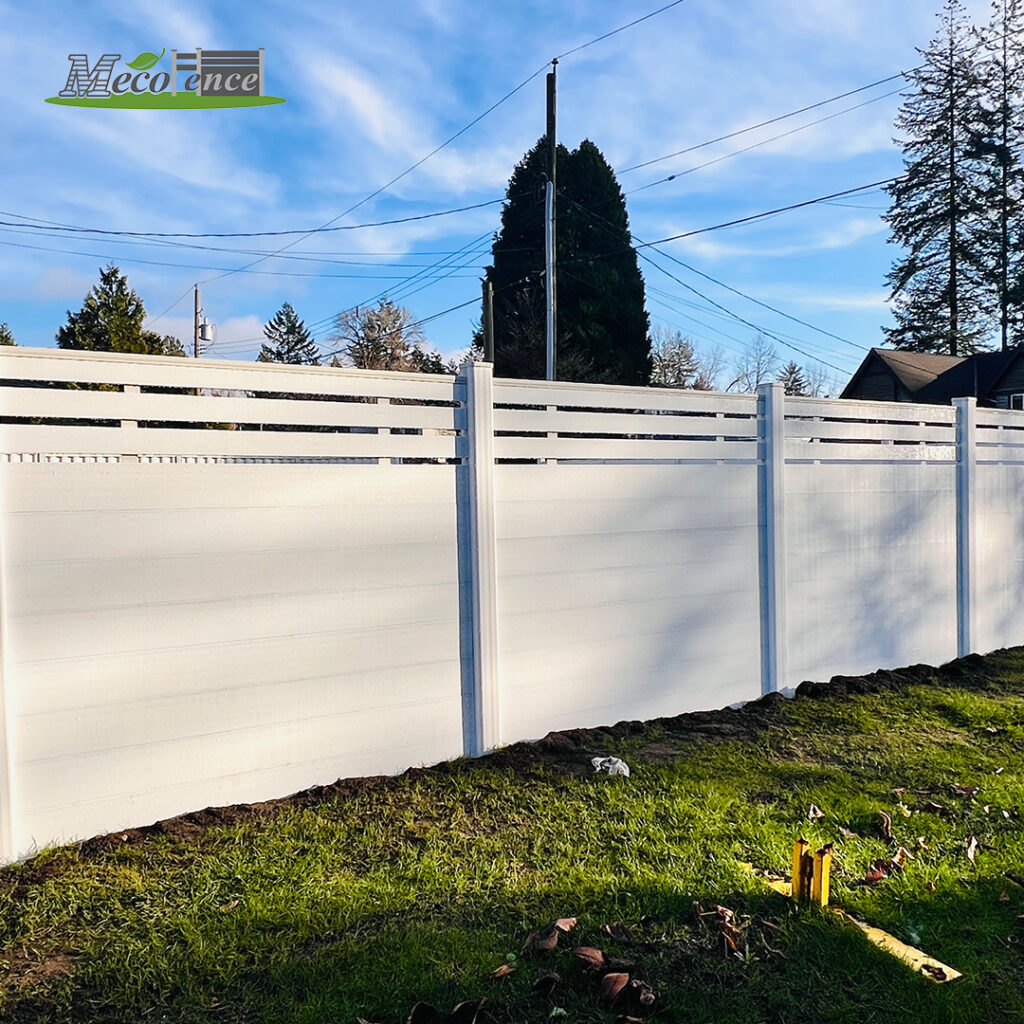When it comes to selecting the right fence for your home, two of the most popular materials are composite and vinyl. Each offers a unique set of benefits and potential drawbacks, which makes it crucial to carefully assess which option aligns best with your needs. In this article, we’ll explore the key features, advantages, and disadvantages of both composite and vinyl fences to help you make an informed decision.
What is a Composite Fence?
A composite fence is crafted from a blend of wood fibers and plastic, designed to mimic the natural appearance of wood while providing enhanced durability and reduced maintenance. The manufacturing process involves combining wood fibers with recycled plastic to produce sturdy and resilient boards.
Advantages of Composite Fences:
Durability: Composite fences are renowned for their strength and longevity. They resist warping, rotting, and insect damage, which makes them far more durable than traditional wood fences. They also won’t splinter or crack over time, ensuring a longer-lasting barrier.
Low Maintenance: One of the most attractive benefits of composite fences is their minimal upkeep. There’s no need to regularly paint or stain the fence, and it can be easily cleaned with a hose or mild detergent.
Eco-Friendly: Many composite fences use recycled materials, offering a more environmentally responsible option compared to other fencing materials. This makes them an ideal choice for homeowners who want to reduce their environmental impact.
Aesthetic Appeal: Composite fences come in a wide variety of colors and styles, giving homeowners the flexibility to choose an option that complements the overall look of their home. Additionally, they can be designed to mimic the beauty of natural wood, offering the aesthetic of wood without the associated maintenance.
Disadvantages of Composite Fences:
Cost: Composite fences tend to come with a higher upfront price tag compared to vinyl or wood fences. However, this cost is often balanced by the savings in maintenance over time.
Heat Sensitivity: Composite materials can expand and contract in response to temperature changes. In very hot conditions, they might become soft or bend, although this is generally not a significant concern in most environments.
Limited Repair Options: If a composite fence becomes damaged, it can be difficult to repair. Typically, a damaged section may require full panel replacement rather than a localized fix.
What is a Vinyl Fence?
Vinyl fences, made from polyvinyl chloride (PVC), have become increasingly popular due to their sleek, modern look and low-maintenance nature. Vinyl fences are designed to be strong and long-lasting, making them a favorite choice for homeowners who want a reliable, minimal-effort fencing solution.
Advantages of Vinyl Fences:
Low Maintenance: Like composite fences, vinyl fences require little maintenance. They never need to be painted or stained, and cleaning can be as simple as washing them with soap and water.
Durability: Vinyl fences are incredibly durable and are built to withstand a variety of weather conditions, including heavy rain, strong winds, and extreme temperatures. They are resistant to rust, cracks, and warping, making them a reliable choice for many different climates.
Variety: Vinyl fences are available in an extensive range of styles, colors, and sizes, allowing you to select the design that best suits your property and personal taste.
Pest Resistance: Vinyl fences are impervious to pests such as termites and ants, which is particularly beneficial in areas with high insect activity. Unlike wood, vinyl won’t be damaged by these pests.
Disadvantages of Vinyl Fences:
Cost: While vinyl fences are durable and low-maintenance, they can also be expensive, especially when compared to wood. However, their long lifespan and minimal upkeep make them a cost-effective option in the long run.
Appearance: Some homeowners feel that vinyl fences lack the natural look and texture of wood or composite fences. While vinyl can mimic the appearance of wood, it may not satisfy those who prefer a more organic aesthetic.
Color Fading: Over time, vinyl fences can fade in color, particularly in regions with intense sunlight. This gradual change can affect the overall appearance of the fence.
Environmental Impact: Despite their durability, vinyl fences are made from plastic, which is not biodegradable. This may be a concern for homeowners who prioritize environmentally friendly products.
Composite vs. Vinyl Fence: A Comparison
When deciding between composite and vinyl fences, several key factors should be considered:
Aesthetic Preferences: If you desire a fence that closely resembles natural wood, composite may be the better option. It offers a more authentic wood grain appearance compared to vinyl, which, while available in various styles, may not replicate the look and feel of real wood as effectively.
Budget: Both composite and vinyl fences can be costly initially. However, they require little maintenance over time, which may justify the investment. Composite fences may save on maintenance costs, while vinyl fences might offer a lower initial cost with similar long-term benefits.
Climate and Environment: Composite fences perform well in areas with varying temperatures and weather conditions. They are resilient but may not be as heat-resistant as vinyl. Vinyl fences are highly durable in extreme weather, making them an excellent choice for harsher climates.
Maintenance Needs: Both composite and vinyl fences are low-maintenance, but composite fences may require occasional cleaning and inspection, while vinyl fences are virtually maintenance-free.
Environmental Considerations: For those focused on sustainability, composite fences may be more appealing because they often incorporate recycled materials. Vinyl, made from plastic, does not biodegrade and may not align with environmentally conscious priorities.
Conclusion
Choosing between a composite and a vinyl fence ultimately depends on your preferences and priorities. Both offer excellent durability, low-maintenance options, and a wide array of styles. Composite fences are perfect for those who appreciate the natural beauty of wood but want the benefits of modern materials, while vinyl fences are ideal for homeowners seeking a modern, durable, and low-maintenance solution that can withstand tough environmental conditions.
Consider your budget, aesthetic preferences, and long-term maintenance when making your decision. Whether you opt for a composite fence or a vinyl fence, investing in a high-quality product will elevate your home’s curb appeal and provide dependable performance for years to come.
For homeowners looking for the perfect blend of modern design and long-lasting durability, the White Composite Fence by MecoFence is an excellent choice. Offering a sleek, contemporary aesthetic paired with the resilience and longevity of composite materials, this fence option combines style and strength, making it an ideal solution for any home in the United States.




